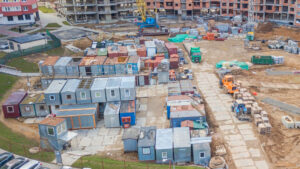
What’s Included in Oil and Gas Facilities Management
Oil and gas facilities management is a complex and critical discipline that ensures energy operations in Canada’s most remote locations

In Canada, energy remote facility maintenance is a growing avenue through which Indigenous participation is transforming industrial operations in remote regions. Indigenous communities, whose traditional territories often overlap resource-rich lands, are becoming active collaborators in energy projects. These partnerships go beyond consultation to include direct roles in managing pipelines, hydroelectric stations, and other remote energy facilities vital to Canada’s economy.
The Canadian energy sector spans oil and gas, hydroelectric power, coal, natural gas, and infrastructure construction, often in remote areas with harsh conditions and logistical challenges. Indigenous involvement in remote facility operations is essential not only for efficiency but also for fostering community empowerment and economic reconciliation.
For decades, energy projects in Canada have faced scrutiny for their environmental impact and for failing to involve Indigenous peoples in a meaningful way. This has changed significantly, in part due to landmark legal rulings affirming Indigenous land rights and consultation requirements, as well as increased demand for ethical business practices from the public and private sectors. Today, Indigenous governments and corporations are co-developing energy initiatives, sometimes holding equity stakes in multimillion-dollar projects and participating in decisions from inception to operations.
One of the most visible shifts has been in project operations and services that support long-term sustainability, such as energy remote site management. Here, Indigenous-owned firms are not just winning contracts—they are setting new standards. These companies offer services deeply attuned to the local context, with Indigenous values of stewardship, respect for the land, and community benefit at their core. This cultural insight, paired with technical proficiency, has made them invaluable in managing the environmental and logistical complexities of remote sites.
Indigenous partnerships often provide the critical staffing and support required for round-the-clock operations in Canada’s remote energy developments. Many Indigenous communities have created workforce development programs to train people for roles in energy remote site services, bringing skills and employment to areas that have often been economically marginalized.
These roles range from technical operations to energy facility management and logistical support. For instance, Indigenous employees are taking on essential functions such as pipeline monitoring, equipment maintenance, camp logistics, and incident response preparedness. This diversification is vital, allowing communities to move beyond seasonal or short-term work to long-term careers with pathways for growth.
The economic spillover of these partnerships is also considerable. Firms owned by Indigenous stakeholders often provide hospitality and logistics, offering catering services, supply chain coordination, and even air transportation to and from remote worksites. Such services build trust between communities and energy developers, as they offer reliable, culturally appropriate, and locally sourced solutions.
A key area of growth lies in facility and camp management services. Indigenous-run firms are expanding their reach by offering remote housekeeping, site sanitation, and janitorial services. Training and employment initiatives help community members qualify for roles such as remote housekeeping staff, improving both community income and operational reliability.
Moreover, jobs like remote site cleaning and maintenance foster a stronger connection to the land. These roles often require a deep understanding of terrain, climate, and localized environmental risks, which Indigenous workers have cultivated over generations. In effect, remote site jobs are evolving into avenues for cultural continuity as well as financial independence.
Positions like remote camp attendant jobs, remote camp cleaning jobs, and remote camp maintenance jobs provide on-the-ground employment opportunities and ensure operations run smoothly. Hiring locally avoids some of the logistical complications associated with flying in workers and creates a direct loop of economic benefit within nearby Indigenous communities.
Security and safety, especially in volatile weather or fire-prone areas, are increasingly entrusted to Indigenous-led security teams. Remote camp security jobs are now filled by professionals who not only know the land but are invested in protecting it and the workers who rely on it. This reduces turnover and builds a steady, place-based workforce.
These projects also support positions once deemed non-essential but now viewed as vital to success. Roles in remote cleaning jobs, remote housekeeping jobs, and other logistical support positions ensure facilities comply with health regulations, especially in a post-pandemic world where sanitation is more critical than ever.

The opportunities go beyond basic job creation. Through joint ventures and procurement agreements, Indigenous groups are gaining access to the business side of energy development—learning how to manage capital, handle contracts, and develop long-term business plans. Remote work camps, once symbols of extraction and disconnection, are slowly being reimagined as platforms for Indigenous entrepreneurship.
One standout development is the rise of Indigenous-owned companies offering remote camp jobs across multiple trades and professions, from engineers to pipefitters. These companies are also winning contracts for janitorial camp services, construction support, and environmental monitoring—embedding sustainability and cultural respect into the DNA of remote facility operations.
Investments in education and mentorship further reinforce these gains. Many Indigenous organizations offer scholarships, apprenticeships, and job shadowing programs to prepare the next generation of leaders in the energy sector. Collaborations with technical colleges and trade schools help develop community members into engineers, electricians, and site managers.
Indigenous partnerships are reshaping Canada’s energy industry for the better. These collaborations not only improve operational efficiency but also promote economic empowerment, cultural respect, and environmental stewardship. From remote cleaning jobs and housekeeping staff to camp maintenance and security roles, Indigenous involvement represents a comprehensive approach to energy facility management that benefits everyone involved. By continuing to build on these partnerships, Canada can create a more inclusive, resilient, and sustainable energy future through strengthened efforts in energy remote facility maintenance.
Looking for trusted leaders in remote site operations and facility support? Connect with the Domco Group to partner with Indigenous communities and build energy solutions that honor the land and its stewards.
Domco Group of Canada Limited is one of the most trusted and well respected remote sites service providers in Canada. Fully Canadian and independently owned, Domco has been in operation since 1945. We offer integrated remote site solutions, including a nutritious and well planned menu cycle, long-term relationship building, and deep Canadian roots in remote locations with Aboriginal communities.
Let us take you through some key advantages that set us apart.

Oil and gas facilities management is a complex and critical discipline that ensures energy operations in Canada’s most remote locations

In the rugged, often isolated world of remote construction camps, construction facility management is the invisible force that sustains daily

Remote maintenance is the backbone of operational continuity in Canadian work camps, especially those located in isolated regions supporting industries

Remote camp health and safety is a vital concern in the management of Canadian remote workforce camps, especially in resource-driven

Keeping crews energized and satisfied starts with smart camp food menu ideas—especially in remote environments where morale and nutrition go

Gas remote camp mobilization is a critical operational phase in Canada’s oil and gas industry, particularly in remote and northern

When it comes to remote site security in Canadian work camps, ensuring safety and protection is paramount. These facilities, often

In Canada’s vast and resource-rich landscapes, remote site maintenance plays a pivotal role in sustaining the operations of work camps

In Canada’s vast and often isolated regions, remote camp management plays a vital role in advancing sustainability across diverse work

Remote site administration is a vital function in Canada’s most geographically isolated and operationally demanding environments. From the Arctic’s frozen

Developing a sustainable infrastructure for a remote camp facility located in the rugged, often isolated regions of Canada—such as the

In Canada’s vast and rugged landscapes, remote facility catering has evolved from a logistical challenge into a platform for sustainable

Budgeting for facility repair and maintenance in remote Canadian work sites is no small task. When miles away from urban

The process of gas remote camp mobilization in Canada is a critical operation that supports the development and maintenance of

Remote facility chefs are the unsung heroes of Canada’s sprawling wilderness operations—from fly-in camps tucked into diamond-rich tundras to energy
